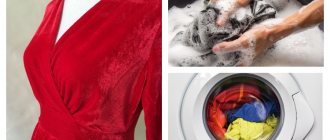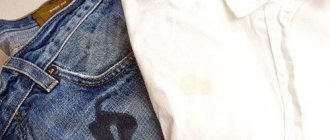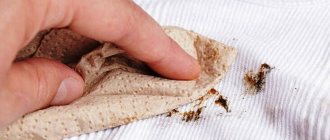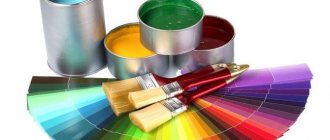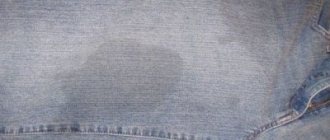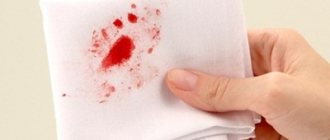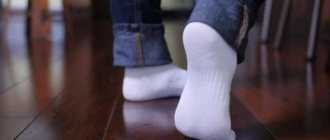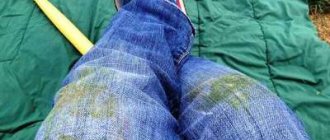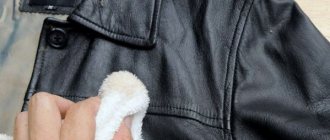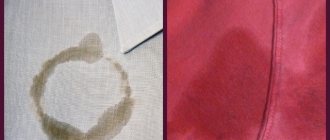Kitchen towels get dirty every day. In terms of contamination, the kitchen is the most dangerous place. These are splashes of grease, drops, stains from jam or fruit; we encounter all this every day.
Getting rid of stains is not so easy. Regular washing cannot remove every stain. For proper service and a neat, pleasant appearance, towels need to be clean. We will look at how to wash kitchen towels from this dirt in this article.
Heavily soiled kitchen towels can be washed by hand in a washing machine. But it is most effective to combine both of these washing methods, when the initial preparation and processing is done manually, and the main one is done in the washing machine. It is important to know how to wash kitchen towels from old greasy stains at home, with or without boiling. What methods are the most effective?
How to wash a towel in a washing machine
The rules for washing textiles from our kitchens, and the main one is that it is easier to wash things that are not very dirty.
To do this, you should listen to these tips:
- There should be several towels in the kitchen at the same time, which are changed as often as possible;
- Stains should be treated immediately, without shelving;
- It is better to wipe the table and stove and remove heavy dirt without resorting to dish towels, but using disposable or special napkins and sponges;
- It is not recommended to use terry towels in the kitchen; they absorb dirt too quickly and are difficult to wash. Products that are easier to care for are better.
In this case, there will be no particular difficulties with washing in a washing machine; it will be enough to take a good powder. When there is no particular dirt or stains, then how to wash our kitchen utensils in a washing machine will be determined only by the properties of colored and white fabrics.
Washing mode and temperature
At what temperature and in what mode to wash towels in an automatic machine depends on several factors:
- Material properties;
- Degree of contamination and nature of stains.
Typically kitchen towels are made from cotton or linen. The fibers of these materials are not afraid of hot water or intense impacts, but other properties of the fabric, coloring and features of the woven fabric may be important here.
It is permissible to wash towels made of white or light-colored fabric at high temperatures:
- With a slight degree of pollution - 60 degrees;
- Requiring bleaching, very dirty, should be washed in an intensive wash cycle at a temperature close to boiling.
Purchased funds
The assortment of modern stores is rich in various household chemicals. On the shelves of the supermarket you will find soap, liquids, washing gels and powders, stain removers, bleaches, etc.
Washing powders
The best powders that have proven themselves in the fight against difficult stains:
- Sarma Active;
- BiMax 100 spots automatic;
- Persil Expert Frosty Arctic.
They are universal, suitable for any fabric, they can be used for soaking, hand washing, and machine washing.
Stain removers
Stain removers are used for colored items, including towels. As a rule, they are based on active oxygen. The best stain removers, according to housewives:
- “Sarma Active 5 in 1” (copes with complex stains even in cool water, ideal for all types of kitchen towels);
- “Ace Oxi Magic” (available for white and colored items, works even at low temperatures, designed for any type of washing);
- “Heitmann OxiWash Intensiv” (removes stains from colored and white textiles, used for machine wash only).
Bleaches
For white towels, bleaches are more suitable, as they usually not only remove stains, but also lighten the fabric.
Important: Aggressive chlorine-containing products are excellent at removing stubborn stains, but they thin out the fibers and cause towels to wear out faster.
The most popular chlorine bleaches are “Ace” and “Whiteness”.
Oxygen-containing bleaches are identical to stain removers. They cope best with complex stains:
- Chirton Oxygen;
- Vanish;
- Bos+;
- Persol.
It is recommended to use bleaches and stain removers for soaking and then add to the powder/gel during washing.
If the stains are old or complex
The towel should be soaked for several hours (at least 2 hours, if the product is cotton or linen, then for 8-10 hours) in warm water with powder and stain remover or bleach. To 10 liters of water add 150 g of powder and 70-80 g of bleach. After soaking, the product must be rubbed well, then washed in an automatic machine.
How to wash kitchen towels using available products
No matter how hard the housewife tries, from time to time kitchen towels acquire stains of various origins and a gray coating appears. Industrial detergents for washing towels can help cope with this - these are the most common household chemicals for automatic washing machines.
But they may not always be at hand. It is better to remove stains immediately. Fortunately, you can get rid of them using folk remedies. In the advice for the housewife, you can find the most everyday things that are in every home - salt, mustard, laundry soap, soda, vinegar, etc.
Each of them is suitable for removing different stains.
Usually they are recommended to be used at the soaking stage; sometimes they need to be added during the washing process. Before analyzing specific recipes that are used to soak dirty towels before washing, we will warn you that you should not do such intensive treatment more often than once a month.
Otherwise, the fabric will quickly wear out and lose color.
One of the most versatile and accessible folk remedies for soaking kitchen towels in before washing is mustard. It is enough to put a few spoons of powder per liter of water and leave it in this solution for half a day, and the stains will go away.
Salt
Another available substance that can get rid of contaminants is ordinary salt. It is used for soaking stains, and then washing becomes noticeably easier. Salt will help remove traces of coffee, tomato juice, red wine and blood. This method is suitable for white, because salt does not stain it any color; it is also suitable for multi-colored towels without discoloring them.
- To remove coffee or tomato stains, prepare a saline solution at the rate of 1 spoon per 1 liter and soak in it for an hour;
- For more stubborn wine or blood stains, add more salt so that the solution is directly supersaturated with salt and soak only in cold water. Most likely, you will also have to keep it in this solution longer until the stains fade.
After this, the items should be rinsed well and washed as usual.
Laundry soap
Caring for kitchen textiles requires attention and care, but not necessarily a lot of money. As many housewives know, it is possible to wash even white towels well with inexpensive laundry soap. It will effectively remove most contaminants.
True, there is a little trick on how to do this for sure.
You need to soap them and put them in a bag for 6 – 8 hours. Then rinse and wash. A solution of potassium permanganate will help to bleach and at the same time disinfect an item with laundry soap. It must be poured into water until it turns pale pink. Planed soap is also added there and washable items are placed there for half a day. Then you need to rinse and wash as usual.
Ways to restore the overall whiteness of kitchen towels
The following solutions will return the whiteness to towels that have turned gray/yellowed over time:
- a bowl of hot water + 200 g mustard powder. Apply a mushy mass onto a wet towel and wrap the textile in a plastic bag for 6-8 hours. After that they wash it. The method is suitable for removing small stains from kitchen products made from natural fabrics: cotton or linen.
- a basin of boiling water + 150 g of soap or powder + a little potassium permanganate (the water should take on a slight pink tint). Washed towels are soaked for half an hour and then rinsed.
- basin of hot water + 4 tbsp. l. boric acid + 150 g of crushed laundry soap. Soaking in the solution lasts a couple of hours, then the towels are washed. A cheap pharmaceutical product does an excellent job of removing grayish deposits and old stains from vegetables and fruits on cotton and linen towels.
Bleaching by boiling
It's grandma's method for getting rid of grayish or yellowish stains, but it's even harsher on fabric than chlorine bleach.
You will need:
- basin of water;
- 150 g of washing powder or a mixture of laundry soap and soda (half a bar of grated soap and 5 tablespoons of soda);
- you can add a little bleach.
How to boil correctly:
- Dirty towels are loaded into the solution.
- Over medium heat, bring the mixture to a boil.
- After this, reduce the heat and, stirring, cook for 15-60 minutes. How long to boil depends on the severity of the contamination.
- Allow to cool and rinse first in warm, then in cold water, adding a little vinegar for a brighter color.
Boiling in an oil solution Some housewives use an oil solution to boil things: 8 tbsp per basin of water. l. vegetable oil. Towels must be boiled for an hour, then washed.
Is it possible to boil towels
The traditional way to effectively bleach laundry at home is to use boiling water.
There are two answers to our title question:
- Washing colored kitchen utensils is done without boiling, as it can damage the color;
- It is used as a way to bleach light-colored towels.
The rules for boiling kitchen towels are:
- Before boiling things, they must be washed, trying to remove the main contaminants.
- Otherwise, boiling may, on the contrary, fix them and it will be completely impossible to remove them;
- You can’t boil it often, as this will make the fabric thinner and wear out faster.
You can boil the laundry well in an hour using baking soda or oxygen bleach. Then rinse and wash again.
Useful tips
The following tips will help extend the life of kitchen textiles:
- For the kitchen, it is most rational to choose waffle and microfiber towels. They dry faster and are easier to wash and rinse. Terry products get dirty and rot faster.
- Wet towels should be placed immediately to dry. Otherwise, a persistent musty odor may appear.
- Kitchen textiles should be washed at least once every 1-3 days. Fresh dirt comes off easier.
- For cleaning, removing grease and dirt in the kitchen, it is better to use disposable or microfiber napkins, and leave fabric ones for hands and dishes.
- Kitchen towels should be washed separately from other items.
- It is better to alternate detergents and stain removers, and use aggressive chemicals no more than once a month.
The cleanliness and shining color of kitchen towels is beautiful and hygienic, it puts you in a good mood in the kitchen and makes working with dishes or at the stove pleasant. Not to mention that this is a valuable touch to the hostess’s image. Even the mother-in-law won’t find anything to complain about.
How to bleach kitchen towels using vegetable oil
Although this is somewhat unexpected, there are ways to wash kitchen towels using vegetable oil. With its help, some stains that are better dissolved by oil solvents are effectively removed.
Contaminants soaked in sunflower oil soften and then come off easily when washed. But now we are talking about whitening with vegetable oil.
The recipe for whitening with oil says:
- Bring at least 5 liters of water to a boil;
- Add vegetable oil, washing powder for automatic washing machines, bleach or stain remover to boiling water, 2 tablespoons each;
- Soak kitchen utensils in this boiling water with vegetable oil and continue boiling for about an hour;
- Then the fire is turned off, the pan is closed with a lid and cools;
- When everything has cooled down, take them out and wash them as always.
Boiling: will it help or not?
The traditional way to clean kitchen towels is by boiling. This method was often used in the past.
But you should not take it into service as the main one for several reasons:
- colored kitchen towels should not be boiled, as they may fade or lose color;
- Suitable for white cotton fabrics only;
- intense exposure to high temperatures can lead to rapid wear of the material;
- Pre-washing is necessary to remove the main contaminants, otherwise under the influence of high temperatures they will, on the contrary, become fixed.
Digestion is a rather lengthy process . To achieve the result, towels must be boiled using soda or another product for at least an hour, then rinsed and washed again.
The video will show you how to remove grease stains from fabrics and towels by boiling:
Citric acid and hydrogen peroxide for old stains
Using soap you can easily get rid of fresh dirt. But how to get rid of old grease stains? It is especially important to know how to wash terry towels, which require more delicate handling than others.
Citric acid and hydrogen peroxide will help get rid of old stains:
- First, using laundry soap, you need to wash off the initial layer of dirt, and then apply a strong solution of citric acid to the stains for five minutes. Wash it off thoroughly;
- To wash dirty towels, prepare a solution of hydrogen peroxide in a proportion of one tbsp. l. for 0.5 liters of water. Soak it in it for half an hour and then wash it.
Top 3 special tools
If home recipes are ineffective or you don’t want to spend a lot of time with stain removal, ready-made household chemicals will help.
When choosing, you need to pay attention to the list of contaminants that the purchased product can handle. These should include an indication of greasy stains.
Stain remover Dr. Beckmann "fats and sauces"
The stain remover from a well-known German company has a volume of 50 ml and costs from 150 rubles per bottle . The special formula of the product includes active ingredients that cope with greasy stains of plant and animal origin, as well as sauces.
The stain remover can be used to treat almost any type of fabric. The product comes in an easy-to-use form and can be used for washing white and brightly colored towels.
Advantages of the product:
- efficiency;
- convenient form - gel;
- affordable price;
- European quality;
- suitable for all fabrics;
- can be used for washing plain towels and with prints;
- ergonomic bottle.
Disadvantages: small volume.
Mode of application:
- Apply stain remover to the stain.
- Leave for 5 to 10 minutes.
- Wash as usual.
Sano oxygen Oxygen Stain Remover
The stain remover produced in Israel is available in a volume of 0.75 liters, the cost of the bottle is from 400 rubles . The product is a universal stain remover that can be used at home.
The stain remover has the Israel Institute of Standards Platinum Mark award.
Advantages:
- high quality;
- efficiency;
- suitable for removing old stains;
- contains active oxygen;
- convenient release form;
- suitable for washing colored items;
- A large volume will last a long time.
Disadvantages: high cost.
Mode of application:
- Using a sprayer, treat the stains.
- Place the towels in the washing machine drum.
- Wash using washing powder as usual.
There should be no more than 10 minutes between stain treatment and the main wash cycle. This is necessary in order to prevent the product from drying out on the material.
Amway spray SA8
The aerosol is intended for pre-treatment of stains before washing, copes with oil and greasy stains. Amway can be used at any temperature. The cost of 1 package is from 550 rubles according to the promotional offer.
Advantages:
- the product is suitable for all types of fabrics;
- high efficiency;
- ease of use;
- suitable for colored laundry;
- convenient on the road;
- has a pleasant aroma;
- economical consumption.
Disadvantages: high price.
Mode of application:
- From a distance of 0.15 m, spray the stain remover onto the stain.
- Wash by hand or machine.
- Dry.
Washing in Japanese
Housewives of older generations still use this method. The components of the product can be found in any home, and their complex action provides excellent results. This wash is suitable for textiles that can be washed at a maximum of 60 degrees .
You will need:
- 6–8 liters of water
- 1 tbsp. l. vinegar (9%)
- 1 tbsp. l. mustard powder
- 2 tbsp. l. vegetable oil
How to wash:
- Heat the water to a temperature of 60 degrees (it’s better if it has already been boiled, then just cool it to the indicated degrees).
- Add mustard powder, oil and vinegar to a bucket of water and stir.
- Soak the towels in the resulting liquid, stirring them thoroughly there, for 10–12 hours.
- After this, wash as usual. Rinse the laundry several times, alternating cold water with hot water.
Method 5. First aid against unpleasant odors - washing with vinegar
The simplest and most effective remedy for the stench of moldy towels is vinegar.
In the washing machine:
- Load dirty towels into the washing machine, add laundry detergent, and select the highest temperature and wash time settings.
- Pour 1/2 to 1 cup of 9% vinegar into the conditioner compartment before or during washing. During the rinse phase, the vinegar will enter the drum and remove odors.
- Remove and hang washed towels immediately after washing.
Manually:
- Soak the product for 5-10 minutes in a 5-9% vinegar solution (can be mixed with water in a 1:1 ratio).
- Rinse the towels thoroughly and hang them up immediately.
See also the material: How to clean the iron inside and outside - 10 home methods.
Microwave
Modern housewives advise using a microwave oven to wash kitchen towels.
Lather the towels with laundry soap and place them in a plastic bag. Wrap the bag (but do not tie it) and place in the microwave. In medium power mode, turn on the oven for 1.5 minutes. Take a minute break and start again for 1.5 minutes. Carefully remove the towels and rinse thoroughly in water. Stains and unpleasant odors will disappear.
To remove a bag of laundry from the microwave, use tongs or oven mitts. Hot!
Methods without boiling
Even the most careful housewives who always keep their kitchen clean will sooner or later have various stains appear on their towels. The sooner you notice them, the easier it is to clean them. The main thing is to choose the right method for this. It should completely remove stains from greasy kitchen towels, as well as preserve the integrity of the fabrics and the brightness of the colors.
The easiest way to deal with this is by washing textiles in an automatic washing machine. The most important thing in this matter is to choose the right washing mode and choose the powder. This will help restore the product to its ideal appearance and prevent the fabric from losing color over time.
Useful means that can be found in the arsenal of every housewife can help remove old greasy stains from the surface. For example, washing dirty kitchen towels with mustard or bleaching with vegetable oil. Traditional recipes have proven themselves on the positive side due to their natural composition and high efficiency. Basically, cleaning activities are carried out using salt, laundry soap, baking soda, dishwashing liquid, citric acid and hydrogen peroxide. Each of them will clean even heavily soiled kitchen towels.
Folk remedies can be used during pre-soaking or already at the washing stage. To preserve the color of fabrics and the brightness of colors, it is better to clean kitchen towels without boiling using traditional recipes no more than once a month.
Dry mustard
There are several ways to wash kitchen towels at home using mustard. It will not only remove greasy stains, but also disinfect the product.
To wash kitchen towels you will need:
- 4 tbsp dry mustard;
- 4 liters of water.
Boil the water, add mustard powder and stir until it dissolves. The solution is then left to cool. After this, it is filtered and dirty towels are placed in the strained mustard solution. They are left in the container for a couple of hours. After this, just rinse the products in cool, clean water, and they are like new again.
Vinegar
For the procedure you will need table vinegar. With its help, even the most stubborn stains are removed. Treatment with vinegar can be carried out by soaking the entire product, boiling or rubbing one spot. In all cases, to prepare the solution, mix water with vinegar at the rate of 1 tablespoon of acid per 1 liter of water.
1 tbsp vinegar per 1 liter of water
Laundry soap
Cleaning towels after greasy stains appear can be very cheap for the housewife if she uses regular laundry soap instead of expensive washing powders. The product has proven itself exclusively on the positive side. Soap will remove most dirt from the surface. The main thing is to correctly perform the following procedure:
- Wash the dirty area;
- Place a kitchen towel in the bag;
- Leave it in this state for 8 hours;
- Remove the textiles from the bag and rinse thoroughly under running water;
- Send the product to the drum of the automatic machine, where it will go through the final stage of washing according to the selected program.
If you need to clean the surface of a white towel, you can additionally use a solution of potassium permanganate. The product will help to bleach and disinfect the fabric. To do this, you need to dilute potassium permanganate in water until it turns pale pink. Then add grated laundry soap to it. All components must be mixed together. When everything is done, dirty kitchen towels are dipped into the solution. They must be left for at least 12 hours. After this, the products are rinsed and washed in the usual way.
Lathering the towel
Place it in a bag
Wash off soap
Washable in a washing machine
Dishwashing liquid
The product can be used not only for washing dishes, but also to give whiteness and an ideal appearance to towels. To do this, you need to add it to water (2-3 drops) and mix thoroughly. When everything is ready, textiles with stains are placed in the solution and left there for a day. Then the products are rinsed and washed by hand or using an automatic machine.
It is quite possible to do without soaking. You can also remove stains by applying and foaming detergent onto a dry item. In this case, it is applied pointwise, a drop on each spot. Leave the towel in the same form overnight. Afterwards, rinse well and machine wash. If the stains are poorly removed, the procedure must be repeated again, also on a dry towel.
Ammonia (and glycerin)
All alcohol-based products do an excellent job of removing stains. Ammonia can be applied directly from the bottle directly to the stain. In this case, the product is left for an hour and then washed with powder.
For particularly difficult stains, it is better to use a mixture of alcohol and glycerin in a ratio of 1:4. The solution is applied to the stain or the entire towel is soaked in it. The holding time is at least half an hour.
Hydrogen peroxide
For cleaning purposes, a solution containing hydrogen peroxide is used. To prepare it, you must observe the following proportion: half a liter of water goes to 1 tablespoon of peroxide. Mix everything thoroughly and soak dirty textiles in the resulting solution for half an hour.
There is another option for removing old grease stains from kitchen towels - mixing peroxide with citric acid. In a duet, these components cope perfectly with even the most difficult cases.
To do this, add 1 tablespoon of hydrogen peroxide and 1 teaspoon of dry citric acid to 100 ml of warm water. Wet the stain with the solution and leave for 3 hours. Then soak the towel in hot water for another half hour. After this, wash it well by hand and then rinse it in the washing machine.
Combine citric acid and glycerin
Apply the composition to the stain and wait 3 hours
Soaking
Citric acid and soap
You can soak towels and boil them in a mixture of citric acid and laundry soap. The solution for both procedures is prepared in the same way:
- 50 g citric acid;
- half a bar of laundry soap;
- pan with water.
The solution must be brought to a boil in both cases. If boiling is necessary, the procedure lasts 15 minutes over medium heat. If you need to soak the towels, then after dissolving the soap in hot water, remove the pan from the heat, put the towels in it and leave for at least 2-3 hours.
By the way, aspirin tablets will help enhance the effect of all components of the solution. To do this, 5 pieces are crushed and added to water.
Shampoo
Few people know that regular hair shampoo will help make washing and removing stains and odors easier. To do this, you need to wet the towel well in hot water (not necessarily boiling water), wring it out lightly and apply shampoo to the stains. Just a drop on each stain will be enough, the main thing is to lather well.
When there is enough foam, you need to leave the towel for half an hour, then wash it by hand or in a machine. This way, not only greasy stains are washed off perfectly, but also old traces of fruit juices. The procedure is suitable not only for white, but also colored towels.
Dip in warm water
Apply shampoo and lather
We erase
Silicate glue and soap
Housewives resort to whatever they can to remove complex contaminants. Silicate glue is no exception. Use the adhesive solution carefully and only on kitchen towels, so as not to spoil the clothes:
- You need to mix 10 liters of water with a grated bar of alkaline laundry soap, 50 ml of silicate glue and a couple of drops of dishwashing detergent;
- Bring the solution to a boil, turn off the heat and place it in a towel container. The soaking time depends on the contamination of the products, but not less than 30 minutes;
- After this procedure, the towels are washed in the washing machine as usual.

